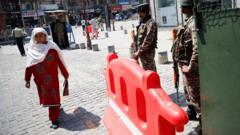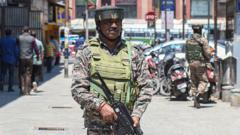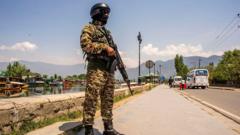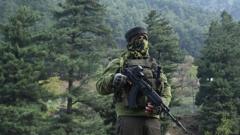As another cycle of violence unfolds in the Indian-administered region of Kashmir after the recent deadly assault in Pahalgam, which claimed 26 innocent lives, experts search for lessons from the past. The current situation recalls previous conflicts, including the Pulwama bombing in 2019, which led to significant military responses from both nations.
### India-Pakistan Tensions Reach New Heights: Historical Patterns of De-Escalation Examined
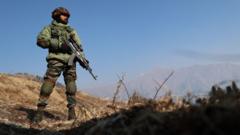
### India-Pakistan Tensions Reach New Heights: Historical Patterns of De-Escalation Examined
The ongoing conflict between India and Pakistan has intensified following a violent attack, prompting scrutiny of past diplomatic efforts to ease tensions.
Historically, India has accused Pakistan of harboring militants responsible for these attacks, claiming a pattern of provocations that has shifted the threshold for conflict escalation. Observers, including former Indian High Commissioner Ajay Bisaria, emphasize a troubling cycle of retaliatory measures and the delicate balance between aggression and diplomacy that India must navigate. "We're witnessing an echo of past events, but with the added severity of civilian casualties," Bisaria remarked, highlighting the unique implications of the latest strike.
In response to recent developments, India has moved swiftly, implementing various countermeasures such as closing border crossings and suspending key agreements with Pakistan. The suppression of air traffic and diplomatic channels reflects a cautious approach to escalation. Amid the military tensions, efforts at communication have persisted, though the threat of renewed violence looms large.
Experts assess the potential consequences of these actions, as the region braces for further developments in a crisis that remains unresolved. With each retaliatory phase, the fragility of peace in the region becomes ever more apparent. The question remains: can history guide efforts to restore stability in a region fraught with animosity? As the situation unfolds, all eyes remain on India and Pakistan's responses to this latest crisis.
In response to recent developments, India has moved swiftly, implementing various countermeasures such as closing border crossings and suspending key agreements with Pakistan. The suppression of air traffic and diplomatic channels reflects a cautious approach to escalation. Amid the military tensions, efforts at communication have persisted, though the threat of renewed violence looms large.
Experts assess the potential consequences of these actions, as the region braces for further developments in a crisis that remains unresolved. With each retaliatory phase, the fragility of peace in the region becomes ever more apparent. The question remains: can history guide efforts to restore stability in a region fraught with animosity? As the situation unfolds, all eyes remain on India and Pakistan's responses to this latest crisis.








